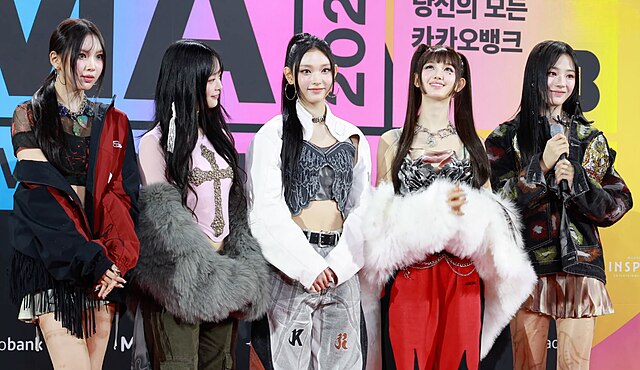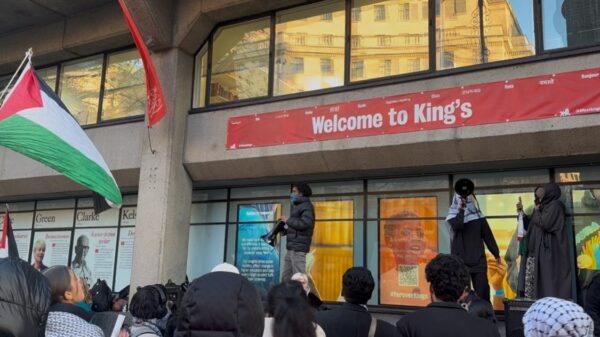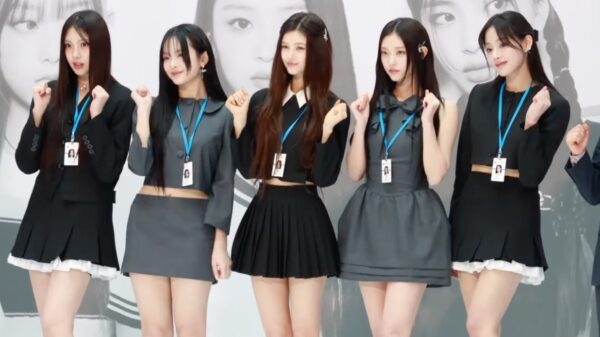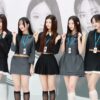Staff Writer Kelly Cheong analyses the precarious nature of workers rights in South Korea’s K-Pop industry in the aftermath of New Jean’s Hanni’s unprecedented testimony.
Readers can find this article’s sister piece in the culture section: “What’s Happening To NewJeans?”
The dispute between HYBE and global sensation NewJeans has been plastered all over the internet in the last few months.
Those following the drama would remember when the conflict came to a boil with NewJean’s shocking move to go on a livestream and air their grievances with HYBE, their label’s parent company. This livestream drew immense public interest, as it is rare for idols in Korea to openly speak out against their company in such a candid and public manner.
A particular allegation made in the livestream which shocked viewers involved a situation between the group’s leader Hanni, and the manager of another HYBE artist. Hanni alleged that she had heard the manager tell the artist to “ignore” her greeting when she passed by and greeted them in the hallway.
The singer claimed that she reported the incident to her label’s management, who brushed it off. This led concerned fans to file claims of workplace bullying to the Korean Government on her behalf. In response, South Korea’s Ministry of Labour and Employment began an investigation into workplace harassment at HYBE.
Almost a month later, Hanni testified at South Korea’s National Assembly, recounting the same incident. She revealed that this was not an isolated occurrence, adding that another senior figure repeatedly ignored her greetings, she stated:
“I believe it’s simply disrespectful, as a human being, not to acknowledge us, regardless of our professional status.”
Hanni’s testimony is unprecedented — no K-pop idol has ever voiced their workplace grievances so publicly. Consequently, this event has ignited widespread online discourse about the prevalence of harassment in the K-pop industry and its impact on artists.
Hanni’s testimony on workplace harrassment in the industry
Hanni alleged that HYBE employees had been bad-mouthing NewJeans on the company’s internal communications app, highlighting what she described as a “negative atmosphere” working in the company. When reporting this to ADOR management, however, she alleged that they dismissed her concerns.
ADOR’s newly minted CEO, Kim Ju-young was also asked to speak at the General Assembly. In response to Hanni’s testimony, she claimed did “everything [she] could” and will begin “listen[ing] more closely” to NewJeans’ concerns.
Notably, when questioned about whether artists are protected by anti-harassment policies at HYBE, she stated that HYBE’s position is that artists are not legally recognized as “workers” under Korean law, and cannot benefit from such policies meant for regular employees.
She is right. On 20 November, South Korea’s Ministry of Labour and Employment issued a statement revealing that the workplace harassment claim (filed by NewJeans fans on Hanni’s behalf) was rejected by the Seoul Western District Office. The statement read:
“It is difficult to consider Hanni a worker under the Labor Standards Act, so the case was administratively closed.”
They noted that this was because Hanni is not classified as a worker under Korean Law. Courts in South Korea have historically treated Korean Idols with entertainment contracts as “exceptional entities”. To be considered a “worker,” individuals must have fixed working hours, labour for wages, and have to be regarded as being in a subordinate relationship with their employer. These are requirements which most if not all K-pop idols fail to meet.
For example, in NewJeans’ case, they do not earn a traditional wage, but rather receive a share of the profits. They have neither fixed working hours nor a fixed workplace due to the nature of their work as artists.
The consequence of a Korean Idols not being legal workers means that they do not have the right to labour protections under law. There is also no special legislation that has been passed to specifically protect Idols from company abuses.
The unfortunate reality of this is that Korean idols have likely been exploited by their agencies for years, with little to no recourse. To add to the problem, most idols are likely afraid to speak out for fear of being blacklisted as ‘rebels’ in the industry, given how hard it is to break into the Korean Music Industry in the first place. It is shocking that legal protections remain inadequate for the individuals at the heart of this billion-dollar industry.
Workers protections for idols
It takes only a quick google search to know of the strict and often controversial practices of Korean entertainment companies in managing their idols. These include imposing harsh diets, enforcing grueling schedules with minimal rest, and even stipulating no-dating clauses in their contracts. The companies meticulously control their idols’ public image, monitoring their every move with the intensity of a helicopter parent. Sadly, what many consider basic human rights are frequently denied to these young individuals.
In 2022, a Bill was proposed to modify articles of the Popular Culture and Arts Industry Development Act to cap the working hours of young entertainers. However, it failed to be passed due to strong opposition from companies in the entertainment industry. This is extremely telling of a systemic issue where profit is placed above the health and safety of these individuals.
Many of these entertainers enter the industry before they even turn legal, and entertainment companies have, time and time again, failed to uphold their responsibilities to safeguard these minors. Fans of K-pop boyband EXO may recall that certain members had filed lawsuits to terminate their exclusive contracts with SM Entertainment last year, alleging that the company pressured them into signing ‘unfair contracts’ when they were younger.
Thankfully, this year, a new Bill with aims similar to the 2022 proposal was introduced in South Korean Parliament. Hopefully, with the current spotlight on companies to treat their workers fairly (thanks to the NewJeans debacle), the Bill will pass into law with fewer objections.
Moreover, on 26 November, a representative from South Korea’s Progressive Party, Jeong Hye-kyung, held a press conference to introduce a proposed bill specifically designed to protect individuals under special contracts.
Jeong emphasised the importance of shielding individuals from workplace harassment “regardless of income, employment relationship, or contractual relationship.” This has since been dubbed as the “Hanni bill”, as a nod to the idol’s bravery for sharing her story in South Korean Parliament.
With these new Bills as a starting point for change, there is hope that entertainment companies will no longer be able to exploit legal loopholes to mistreat their idols. Since NewJeans spoke out, more idols have followed suit, filing lawsuits against their companies for mistreatment—perhaps signalling the end of an era where idols are silenced.
The future of the Korean entertainment industry
A dark cloud looms over the future of the K-pop industry — can they change their ways? If not, what will happen to our artists? The generation that kept quiet is gone, and with Gen Z idols now taking the stage, it seems they’re less willing to tolerate abuse.
It is almost ironic how an entertainment industry, tasked with bringing joy to people through music, brings hardship to the very stars who make it happen. We can only hope that, with time, more idols speaking out and meaningful changes in legislation will put an end to the abuses in entertainment companies. Until then, K-pop will remain overshadowed by its darker realities.



















